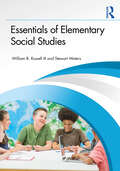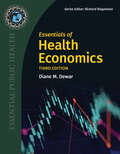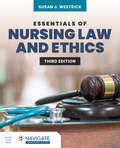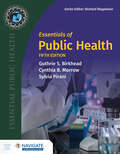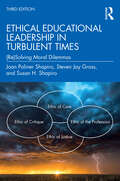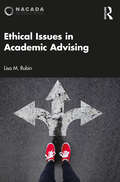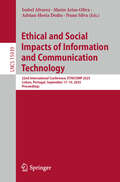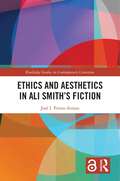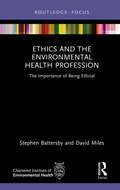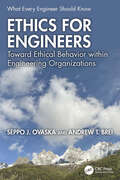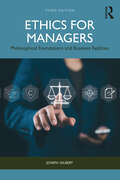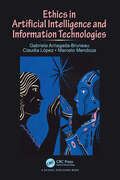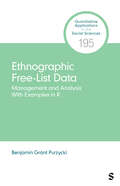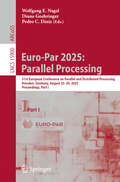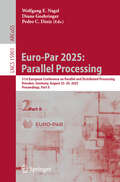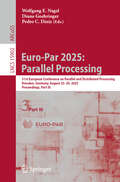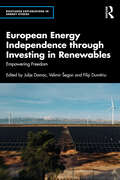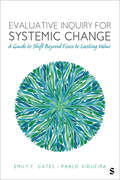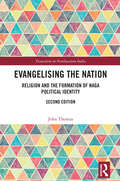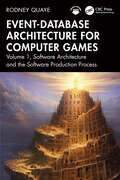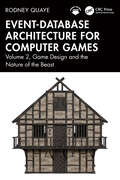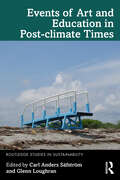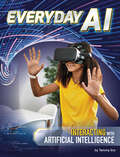- Table View
- List View
Essentials of Elementary Social Studies
by Stewart Waters William B. Russell IIIEssentials of Elementary Social Studies is a teacher-friendly text that provides comprehensive treatment of classroom planning, instruction, and strategies. Praised for its dynamic approaches and a writing style that is conversational yet professional, this book enables and encourages educators to effectively teach elementary social studies using creative and active learning strategies. This seventh edition has been refined with new and relevant topics and strategies needed for effectively teaching elementary social studies. Updates include: A refreshed chapter on technology designed to better prepare elementary teachers to effectively incorporate technology, including artificial intelligence, into social studies instruction while understanding the benefits and dangers New classroom-tested, elementary-appropriate lesson plans for each grade level (K-6), in keeping with the book’s emphasis on planning and teaching New discussions on promoting inclusive practices in the classroom and supporting neurodiverse students and students with learning disabilities Additional attention to discussions around citizenship for younger grades New and revised case studies New "Checking for Understanding" sections at the end of each chapter that offer comprehension, application, and reflection on key concepts throughout the chapters Supplemental digital and video sources related to various topics throughout the chapter Full of practical guidance for K-6 teaching, Essentials of Elementary Social Studies is essential reading for pre-service teachers in Social Studies Education and Elementary Education as well as in-service elementary social studies teachers.
Essentials of Health Economics, Third Edition
by Diane M. DewarWritten with the non-specialist in mind, Essentials of Health Economics, Third Edition examines the public health care system through the lens of economic theory. Through numerous examples, case studies, and profiles related to the field, students will learn the importance of health economics and its relevance to more general analysis of health policy issues.With new information on healthcare reforms faced at the state, national, and international level, new chapter on COVID,19, fresh profiles of notable economists, updated statistics, and more, the Third Edition provides a timely and accessible introduction that focuses on how to do descriptive, explanatory, and evaluative economics in a systematic way. Learn more about Third Edition in this video interview with Diane Dewar. New chapter on COVID-19 that provides a case study in emergency preparednessExpanded chapters on technology and health care workforce discuss the roles of digital health and physician extenders, respectivelyNational and international comparisons provided throughout given the global nature of health and healthcareNewly updated chapters in health care reform in national, state, and international realmsUpdated statistics and current events in policy and economics throughout End-of-chapter real world case studies encourage for application of principles discussed in each chapterUpdated and/or new notable economist profiles for students to learn about the field of health economics Health Economics courses in programs of public health, health administration, nursing, pharmacy and other allied health professions. © 2026 | 200 pages
Essentials of Nursing Law and Ethics
by Susan J. WestrickEssentials of Nursing Law and Ethics continues its focus on the legal aspects of Nursing as it relates to patient safety and quality, environmental health and safety, error reduction and ethical boundaries of practice in an updated third edition. Written by a nurse attorney, this unique text presents complex topics to undergraduate nursing students in an understandable manner while providing accurate and well researched content relevant to nursing practice. The Third Edition was thoughtfully revised and updated to incorporate gender neutral, inclusive, patient-centered and person-first language throughout. Furthermore, it features new and updated case law examples and updated coverage of timely topics, including documentation, patient teaching, confidentiality, end of life issues, advance directives, refusing a patient assignment, sexual harassment in the workplace, use of social media by nurses, error reduction/disclosure, correctional nursing, age discrimination, the ADA, and more.
Essentials of Public Health
by Cynthia B. Morrow Guthrie S. Birkhead Sylvia PiraniEssentials of Public Health, Fifth Edition is a thorough introduction to the field of public health, blending public health practice concepts, government public health, and careers in public health.Using the concept of Public Health 3.0 (a set of aspirational goal to move the public health system into the future), the first section delves into foundational public health principles, governmental structures, healthcare relationships, and pandemic preparedness, offering a thorough understanding of the field. The second section uniquely highlights various public health occupations and careers, equipping readers with an understanding of the diverse roles within the public health workforce. Covers the latest trends and concepts including the 10 Essential Public Health Services (EPHS), Health People 2030, health equity, and more.Offers a new chapter (6) entitled Pandemic and All-Hazards Public Health Preparedness which emphasizes the critical lessons learned from the COVID-19 pandemic and highlights the essential role of public health in safeguarding community health during emergencies.Uniquely explores public health careers, offering 6 job-specific chapters covering careers in Public Health Administration, Environmental & Occupational Health; Public Health Nursing; Epidemiology & Statistics and more. Features updated tables, figures, and weblinks throughout the text illustrate key concepts and provide useful resources. Includes revised and expanded "Outside-the-book" thinking exercises as well as discussion questions to engage students further. Introductory Public Health courses in Public Health, Nursing, and other health disciplines. © 2026 | 350 pages
Ethical Educational Leadership in Turbulent Times: (Re) Solving Moral Dilemmas
by Steven Jay Gross Joan Poliner Shapiro Susan H. ShapiroEducational leaders not only face moral and ethical decisions regarding their classrooms, schools, districts, and education institutions, but they also must consider the complexities and threats that impact their communities. Amidst the ongoing challenges of pandemics and natural disasters, this process is exceptionally daunting. Ethical Educational Leadership in Turbulent Times is an engaging, case-study-based text that assists leaders in their ethical decision-making processes during a time of turbulence and uncertainty. The book is framed by Gross’ Turbulence Theory and Shapiro and Stefkovich’s Multiple Ethical Paradigms of justice, critique, care, and the profession. Presenting clear explanations of theory in combination with authentic dilemmas developed by practitioners, this book will assist leaders in dealing with challenging situations in their own settings. Ethical Educational Leadership in Turbulent Times, 3rd edition is a valuable book for both aspiring and practicing educational administrators and leaders.New in this edition: Updated cases throughout to reflect contemporary issues and recent scholarship in the field New topical case coverage on topics relating to the post-pandemic climate, race and ethnicity, social media, and culturally sensitive teaching An entirely new chapter with cases about technology, including the strengths and weaknesses of AI in education
Ethical Issues in Academic Advising
by Lisa M. RubinThis foundational resource provides a comprehensive exploration of ethical challenges in academic advising, collating with decision-making frameworks informed by best practice and theory.The daily decisions of academic advisors are rooted in ethical issues that impact students, faculty, other advisors, and the greater institution at large. Authored by a leading academic advising scholar-practitioner with two decades of experience, this book defines ethics, explains why it is important, and outlines how to make ethical decisions in an academic advising context. Case studies and reflection questions engage readers through real-world application and help make sense of new approaches and ways of thinking to support students.The fundamental knowledge and practical guidance contained in this book will empower new, seasoned, and aspiring academic advisors to feel confident and prepared to make sound decisions when faced with a diverse range of ethical dilemmas.For information and resources about academic advising or to become a member of NACADA, please visit https://nacada.ksu.edu/.
Ethical and Social Impacts of Information and Communication Technology: 22nd International Conference, ETHICOMP 2025, Lisbon, Portugal, September 17–19, 2025, Proceedings (Lecture Notes in Computer Science #15939)
by Adrian-Horia Dediu Nuno Silva Isabel Alvarez Mario Arias-OlivaThis book constitutes the refereed proceedings of the 22nd International Conference on Ethical and Social Impacts of Information and Communication Technology, ETHICOMP 2025, held in Lisbon, Portugal, during September 17–19, 2025.The 51 full papers presented in this volume were carefully reviewed and selected from 165 submissions. The papers are organized in the following topical sections: Ethics, Society; Eduction; Systems; and Security.
Ethics and Aesthetics in Ali Smith’s Fiction (Routledge Studies in Contemporary Literature)
by José I. Prieto-ArranzThis study offers a fresh perspective on Ali Smith’s work, analysing her fiction through a truly interdisciplinary lens. José I. Prieto-Arranz explores Smith’s engagement with contemporary issues such as digital violence, disinformation, pornography, nationalism, climate change, discrimination, and social fracture. Simultaneously, this book examines Smith’s unique stylistic choices, including her use of magical realism, intertextuality, and intermediality, to reveal the intricate connection between the ethical and aesthetic dimensions of her novels. Through close readings of Smith’s novels, from Like to Companion Piece, enriched with insights from her prolific short fiction, the author demonstrates how Smith constructs a “text continuum,” revealing recurrent themes and stylistic choices that underline her firm belief in the transformative power of fiction and, by extension, art. This book will appeal to scholars of contemporary literature, art theory, political science, sociology and cultural studies, and anyone interested in literature and social commentary.
Ethics and the Environmental Health Profession: The Importance of Being Ethical (Routledge Focus on Environmental Health)
by Stephen Battersby David MilesProviding an exploration of the discussion on how a stronger ethical basis for the work of environmental health practitioners (EHPs) can contribute to improved public health, because EHPs/environmental health officers (EHOs) come into daily contact with members of the public to address threats to their health and wellbeing. This book examines what is meant by professional ethics and the role of professional bodies in ensuring members of the profession act ethically. They should be expected to act as guardians of the public interest, without fear or favour. Ethics is an integral part of public health decision-making and needs to be incorporated into public and environmental health policy development and decision-making. This work, while seeking to stimulate debate within the environmental health profession, will examine what this means for EHPs.Ethics and the Environmental Health Profession: The Importance of Being Ethical explores the process of ethical decision-making in the environmental health profession and asks the question of whom EHPs have an ethical duty towards in their work. It looks at a variety of ethical issues which arise for EHPs working in local government, as consultants or for commercial companies.This book is useful for EHPs globally, other local government officers, educational establishments where environmental and public health courses are run globally, elected members of local authorities, and policymakers at national and local government levels.
Ethics for Engineers: Toward Ethical Behavior within Engineering Organizations (What Every Engineer Should Know)
by Seppo J. Ovaska Andrew T. BreiEthics for Engineers: Toward Ethical Behavior within Engineering Organizations offers a multilevel perspective on engineering ethics with considerable breadth and depth, making it a valuable resource for students, educators, and professionals alike.This pragmatic book contains case studies of micro-level ethical violations, evaluating their moral implications and discussing moral self-licensing behind making unethical decisions. It also explores macro-level cases that have caused significant reputational and financial damage to major companies. In addition, the authors touch on topics whose overall impact is not yet fully understood, such as environmental ethics issues related to wind turbine blades and space debris management. By presenting examples from different levels and offering reflections from various perspectives, this text prompts readers to critically evaluate the ethical implications of their actions and understand what may drive a work community to behave unethically.Key features: Covers both moral theoretical and behavioral ethics perspectives. Contains day-to-day micro-level cases from the lives of practicing engineers, supplemented with macro-level cases. Provides pragmatic guidance for individual engineers and their organizations to move toward value-based ethics. Features colloquial language to make the book an enjoyable and accessible read. Includes 29 demonstrative vignettes, 87 class exercises, and an insightful interview with an ethics ambassador. This unique text serves as a pedagogically sound learning companion for courses in engineering ethics and related topics, striking a balance between research-based findings (with over 40 scholarly references) and real-world experiences (featuring an Appendix by an industry executive).
Ethics for Managers: Philosophical Foundations and Business Realities
by Joseph GilbertEthics for Managers introduces students to the philosophical underpinnings of business ethics and translates this theory into practical terms, demonstrating the moral implications of the decisions managers make. It explains the decision-making processes and constraints that managers face, regardless of their level or function. It then proceeds to show how to identify and analyze the ethical aspects of these decisions.This third edition features updated examples and references throughout. It contains new material on managing employees working from home, increased emphasis on the pattern aspects of individual decisions and on the systemic constraints that affect managers’ decisions. There is a completely new chapter on artificial intelligence. This chapter explains at a basic level what artificial intelligence is, and examines its impact on decisions concerning the hiring, monitoring, evaluating, profiling and termination of employees.Student-friendly features include learning objectives at the beginning of each chapter, examples that demonstrate real-world business decisions, and end of chapter discussion questions. These discussion questions provide opportunities for applying chapter materials to actual decisions and can stimulate class discussion or serve as test questions. Students will find this compact, well-organized text a useful tool for understanding ethics in the digital age.
Ethics in Artificial Intelligence and Information Technologies
by Marcelo Mendoza Gabriela Arriagada-Bruneau Claudia LópezThis book addresses the challenges posed by adopting and developing new AI technologies and how they impact people. Ethics, the scope, and the impact of technology on people are vital. The book starts with the ethical aspects of AI, presenting a socio-technical approach to integrating Ethics into AI projects, and outlines perspectives around feminism, sustainability, and labor transformation. Next, the concepts of fairness, accountability, and transparency are introduced, discussing their implications for developing information systems such as recommender systems, including aspects related to data privacy. Then the book covers the relevance of natural language processing systems, highlighting debias strategies and evaluation methodologies. The scopes of fairness-based approaches for ChatGPT and other generative text models are also introduced. Finally, advanced topics that include the relationship between AI and disinformation are addressed, including a discussion of the scope of news-generative models such as deep fakes. The book ends with a discussion of the perspectives and challenges in the area.The book is meant for an audience of advanced undergraduate and graduate students from all disciplines related to information systems. It is also helpful for researchers and practitioners interested in the subject.
Ethnographic Free-List Data: Management and Analysis With Examples in R (Quantitative Applications in the Social Sciences)
by Benjamin Grant PurzyckiEthnographic Free-List Data: Management and Analysis With Examples in R details a method that involves research participants listing what they know or think about the researcher’s topic of interest. While researchers typically report these free-list analyses in isolation, this book incorporates them with other analytical methods and demonstrates how ethnographic free-lists can be useful to a broad social science audience. The first half of the book covers descriptive methods, and the second half incorporates insights from the early chapters into a predictive statistical framework. Author Benjamin Grant Purzycki explains how to collect, clean, and manage free-list data and how to use R to calculate and visualize the data.
Ethnographic Free-List Data: Management and Analysis With Examples in R (Quantitative Applications in the Social Sciences)
by Benjamin Grant PurzyckiEthnographic Free-List Data: Management and Analysis With Examples in R details a method that involves research participants listing what they know or think about the researcher’s topic of interest. While researchers typically report these free-list analyses in isolation, this book incorporates them with other analytical methods and demonstrates how ethnographic free-lists can be useful to a broad social science audience. The first half of the book covers descriptive methods, and the second half incorporates insights from the early chapters into a predictive statistical framework. Author Benjamin Grant Purzycki explains how to collect, clean, and manage free-list data and how to use R to calculate and visualize the data.
Euro-Par 2025: 31st European Conference on Parallel and Distributed Processing, Dresden, Germany, August 25–29, 2025, Proceedings, Part I (Lecture Notes in Computer Science #15900)
by Pedro C. Diniz Wolfgang E. Nagel Diana GoehringerThe three-volume set LNCS 15900-15902 constitutes the proceedings of the 31st European Conference on Parallel and Distributed Processing, Euro-Par 2025, which took place in Dresden, Germany, during August 25–29, 2025. The 78 papers included in these proceedings were carefully reviewed and selected from 264 submissions. They were organized in topical sections as follows: Part I: Programming, compilers and performance; scheduling, resource management, cloud, edge computing, and workflows; Part II: Architectures and accelerators; data analytics, AI, and computational science; Part III: Theory and algorithms; multidisciplinary, domain-sepcific and applied parallel and distributed computing.
Euro-Par 2025: 31st European Conference on Parallel and Distributed Processing, Dresden, Germany, August 25–29, 2025, Proceedings, Part II (Lecture Notes in Computer Science #15901)
by Pedro C. Diniz Wolfgang E. Nagel Diana GoehringerThe three-volume set LNCS 15900-15902 constitutes the proceedings of the 31st European Conference on Parallel and Distributed Processing, Euro-Par 2025, which took place in Dresden, Germany, during August 25–29, 2025. The 78 papers included in these proceedings were carefully reviewed and selected from 264 submissions. They were organized in topical sections as follows: Part I: Programming, compilers and performance; scheduling, resource management, cloud, edge computing, and workflows; Part II: Architectures and accelerators; data analytics, AI, and computational science; Part III: Theory and algorithms; multidisciplinary, domain-specific and applied parallel and distributed computing.
Euro-Par 2025: 31st European Conference on Parallel and Distributed Processing, Dresden, Germany, August 25–29, 2025, Proceedings, Part III (Lecture Notes in Computer Science #15902)
by Pedro C. Diniz Wolfgang E. Nagel Diana GoehringerThe three-volume set LNCS 15900-15902 constitutes the proceedings of the 31st European Conference on Parallel and Distributed Processing, Euro-Par 2025, which took place in Dresden, Germany, during August 25–29, 2025. The 78 papers included in these proceedings were carefully reviewed and selected from 264 submissions. They were organized in topical sections as follows: Part I: Programming, compilers and performance; scheduling, resource management, cloud, edge computing, and workflows; Part II: Architectures and accelerators; data analytics, AI, and computational science; Part III: Theory and algorithms; multidisciplinary, domain-specific and applied parallel and distributed computing.
European Energy Independence through Investing in Renewables: Empowering Freedom (Routledge Explorations in Energy Studies)
by Julije Domac Velimir Šegon Filip DumitriuThis book delves into Europe’s urgent quest for energy independence as a foundation for the EU and national sovereignty, economic resilience and climate leadership. Amid the rising geopolitical tensions and accelerating climate crises, it advocates for a bold shift towards renewable energy investments as a pathway to a sustainable, energy-secure future.Offering an in-depth exploration of policy innovations, strategic imperatives and case studies, the book highlights how decentralized energy systems and local empowerment can drive resilience and self-reliance. It underscores Europe’s potential to lead the global renewable energy transition, serving as a blueprint for other regions tackling energy insecurity and climate change. The book demonstrates how the EU and its nations can simultaneously enhance energy security and achieve their climate goals through strategic investment in renewables.The book is designed for policymakers, academics and energy professionals, particularly those involved in European energy, climate and economic strategies. It is also an essential resource for university professors and researchers in energy policy, international relations, sustainability and European studies. Regional and local leaders will find valuable insights on implementing transformative energy solutions tailored to their communities.
Evaluative Inquiry for Systemic Change: A Guide to Shift Beyond Fixes to Lasting Value
by Emily F. Gates Pablo VidueiraIn a world where social, ecological, health, and other problems are influenced by multiple, intersecting systems, why do most interventions target single-factor solutions? Why does so much evaluation settle for incremental change, and how could it contribute instead to deeper, lasting, transformative change? Authors Emily F. Gates and Pablo Vidueira make two interconnected arguments in this book: they critique the "fixed" approach of traditional program evaluation and policy analysis, and they advance an alternative approach centered on changing systems and developing the value of efforts toward change. They demonstrate that systemic change that embeds evaluative inquiry is a theoretically supported, practical way to work toward fundamental social change with lasting impact.
Evangelising the Nation: Religion and the Formation of Naga Political Identity (Transition in Northeastern India)
by John ThomasEvangelising the Nation examines the extent to which a particular articulation of Christianity mediated the formation of national identity among the Nagas who inhabit the hill tracts between the Brahmaputra River in India and the Chindwin River in Burma (now Myanmar). This revised second edition revisits the defining attributes of this process and brings to forefront the agential role of religion in shaping modern political identities.This book, based on meticulous archival research, tracks the transmutations of Protestantism from the United States to the hill tracts of Northeast India, and its impact on the form and content of the nation that was imagined and longed for by the Nagas. It also examines how missionaries, local church leaders, and the colonial and post-colonial state mediated nationalist aspirations among the Nagas during the twentieth century.Part of Transitions in Northeastern India series, this lucidly written book will be of interest to scholars and researchers of South Asian history, religion, political science, sociology and social anthropology, and particularly those concerned with Northeast India.
Event-Database Architecture for Computer Games: Volume 1, Software Architecture and the Software Production Process
by Rodney QuayeEvent-Database Architecture for Computer Games proposes the first explicit software architecture for game development, answering the problem of building modern Computer Games with little or no game design. An archetypal software production process, based on this architecture, is also introduced.This volume begins by describing the formal definition of software production processes in general and the production process of Computer Games in particular. It introduces the two basic principles behind the software architecture that addresses the communication and productivity problems of a degenerative production process. It goes on to describe the archetypal software production process and outlines the role that the Game Designers, Game Programmers, Game Artists, Sound Designers and Game Testers play in that process.This book will be of great interest to professional game developers involved in programming roles, such as Tools Programmers, UI Programmers, Gameplay Programmers and Engineers, as well as students studying game development and programming.Rodney Quaye is Senior Software Development Engineer in Test at Build A Rocket Boy. He has worked in the Computer Games industry for over 16 years. He has worked at several Games Studios including Sumo Digital, nDreams, Supermassive Games, Traveller’s Tales, Hotgen, Oysterworld, Second Impact, Flaming Pumpkin, Goldhawk Interactive, Jagex, Gusto Games, Criterion, Asylum Entertainment, Codemasters and Deibus Studios. The famous titles he has worked on include Burnout 2 and 3 for Criterion, LMA Manager for Codemasters, Runescape for Jagex, Lego Worlds for Traveller’s Tales, and Everywhere for Build A Rocket Boy.
Event-Database Architecture for Computer Games: Volume 2, Game Design and the Nature of the Beast
by Rodney QuayeEvent-Database Architecture for Computer Games proposes the first explicit software architecture for game development, answering the problem of building modern computer games with little or no game design. In this volume, an example of a practical production process based on the software production process is explained, including examples of the game design, technical design, data design and tools design in that process.This volume includes a brief overview on how to optimise the results. This leads on to an exploration of how staff, especially Software Engineers, typically view optimisation. It also explains how the vision of the Engineers relates to the vision of the leadership of a project or company. It describes how this leadership can also affect the efficacy of a production process, including the Event-Database Production Process.This book will be of great interest to professional game developers involved in management roles such as Technical Directors and Game Producers and technical roles, such as Tools Programmers, UI Programmers, Gameplay Programmers and Engineers, as well as students studying game development and programming.Rodney Quaye is Senior Software Development Engineer in Test at Build A Rocket Boy. He has worked in the Computer Games industry for over 16 years. He has worked at several Games Studios, including Sumo Digital, nDreams, Supermassive Games, Traveller’s Tales, Hotgen, Oysterworld, Second Impact, Flaming Pumpkin, Goldhawk Interactive, Jagex, Gusto Games, Criterion, Asylum Entertainment, Codemasters and Deibus Studios. The famous titles he has worked on include Burnout 2 and 3 for Criterion, LMA Manager for Codemasters, Runescape for Jagex, Lego Worlds for Traveller’s Tales and Everywhere for Build A Rocket Boy.
Events of Art and Education in Post-climate Times (Routledge Studies in Sustainability)
by Carl Anders SäfströmThis book concerns the urgency of thinking and acting in response to climate change through art and education. While both fields are often connected through disciplinary dialogues, climate change prompts a greater need to unite artists and educators around common environmental problems and goals.By staging transcritical engagements, this book draws out common and uncommon disciplinary perspectives that can generate new ways of thinking, living, and doing in the Anthropocene. Ideas around courage, resilience, life, and death emerge. An expression of active, non-violent resistance to the ongoing destruction of our planet, this book supports imaginative action, popular sovereignty, and the courage to live well within the challenges of our era. Engaging artists’ and educators’ questions, it maps significant differences and potential intersections for further enquiry.Events of Art and Education in Post-climate Times will be helpful for students studying art, education, environment, sustainability, and climate change. It will also interest researchers, practising artists, and teachers in these disciplines by being at the forefront of current discussions in both fields.
Every Molecule Matters
by Simon CottonEvery Molecule Matters is a successor to the author’s earlier Every Molecule Tells a Story and tells the story of a wide range of molecules.These range from the familiar odours that enhance the pleasure of eating (and the spices that add piquancy) to the vitamins vital to our survival, as well as the ways in which insects and plants use chemicals to protect themselves. There’s controversy surrounding the compounds of chlorine, which encompass life‑supporting anaesthetics and natural antibiotics, as well as insecticides like DDT, which saved innumerable lives but became an environmental cause célèbre. Through the addictive power of nicotine, smoking tobacco transformed from a curiosity imported from the Americas into a megapound industry that has caused significant human illness and death. And how safe is vaping? Discover the painkillers that have become drugs of abuse, and smile at the smelly sulfur compounds that serve as unpleasant human odorants (and defence molecules for skunks), control natural cycles in the environment or act as flavourings in wine. You will discover them all here.This book showcases the structures of hundreds of compounds used by humans, animals and plants. Some are beneficial; some are not. Find out here why you should be better informed about them.• This collection of molecules includes human issues, such as the chemistry of vaping, and drugs of abuse, including ‘spice’, nitazenes and fentanyl.• ‘Chemistry of Everyday’ includes vitamins and the molecules that give foods their aromas and appetizing appeal.• The chemistry of nature ‑ how plants and insects use chemicals to defend themselves against potential predators, whether humans, birds, animals or other insects.• Organohalogen compounds, encompassing the atmosphere-damaging CFCs and their replacements, and the chlorine compounds that are important medicines (e.g. vancomycin).• Using isotopes, from archaeologists faced by mysteries of ancient Rome and silver from Spanish conquistadors, to tracking down the origin of South American cocaine and solving the ‘Scissor Sister’ murder case.
Everyday AI
by Tammy EnzVoice assistants. Smart boards. Video game opponents that seem to learn your moves. Artificial intelligence is everywhere . . . even in places you might not expect! In this eye-opening book for young readers, explore how AI is shaping everyday life, from classrooms and hospitals to entertainment and transportation. Real-world examples, such as how AI helps students learn in personalized ways or how doctors use AI to detect diseases, highlight the incredible impact of this budding technology. With fun facts, engaging text, and must-know AI basics, this book will help young readers understand and interact with the AI-powered world around them.
